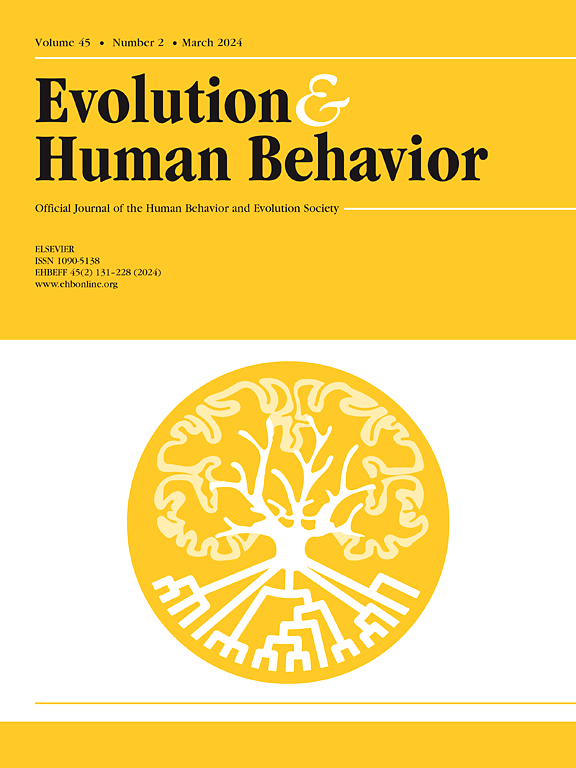Children's imitation of costly rituals: Insights into early cultural learning
IF 3.2
1区 心理学
Q1 BEHAVIORAL SCIENCES
引用次数: 0
Abstract
Rituals are deeply ingrained in human lives and play significant roles from a young age. Children demonstrate a remarkable willingness to faithfully copy rituals, however, limited studies have examined whether this extends to situations involving material costs. This study builds on this literature by examining how children respond to matching ritual versus ordinary actions when imitation involves varying material costs. A total of 130 children aged 4 to 7 were shown two distinct methods to acquire stickers at a local science museum: one involving causally irrelevant ritualistic actions and the other, instrumentally functional actions. Both methods resulted in giving up the opportunity to win more stickers. Results showed that children prioritised copying rituals over functional actions, even at a material cost. However, while children faithfully replicated relevant action components, they reproduced both irrelevant ritual and functional actions at lower rates. We conclude that while children are strongly inclined to learn culturally important rituals, they are ultimately strategic imitators.
儿童对昂贵仪式的模仿:对早期文化学习的洞察
仪式在人类生活中根深蒂固,从小就扮演着重要的角色。孩子们表现出忠实地模仿仪式的非凡意愿,然而,有限的研究已经检查了这种情况是否延伸到涉及物质成本的情况。本研究建立在这些文献的基础上,研究了当模仿涉及不同的物质成本时,儿童对匹配仪式和普通行为的反应。在当地的一家科学博物馆,共有130名4至7岁的儿童被展示了两种不同的获取贴纸的方法:一种涉及因果无关的仪式性行为,另一种涉及工具性功能行为。这两种方法的结果都是放弃赢得更多贴纸的机会。结果显示,即使付出物质代价,孩子们也会优先考虑模仿仪式而不是功能性行为。然而,当孩子们忠实地复制相关的动作成分时,他们以较低的速度复制不相关的仪式和功能动作。我们的结论是,虽然孩子们强烈倾向于学习文化上重要的仪式,但他们最终是战略性的模仿者。
本文章由计算机程序翻译,如有差异,请以英文原文为准。
求助全文
约1分钟内获得全文
求助全文
来源期刊

Evolution and Human Behavior
生物-行为科学
CiteScore
8.30
自引率
9.80%
发文量
62
审稿时长
82 days
期刊介绍:
Evolution and Human Behavior is an interdisciplinary journal, presenting research reports and theory in which evolutionary perspectives are brought to bear on the study of human behavior. It is primarily a scientific journal, but submissions from scholars in the humanities are also encouraged. Papers reporting on theoretical and empirical work on other species will be welcome if their relevance to the human animal is apparent.
 求助内容:
求助内容: 应助结果提醒方式:
应助结果提醒方式:


